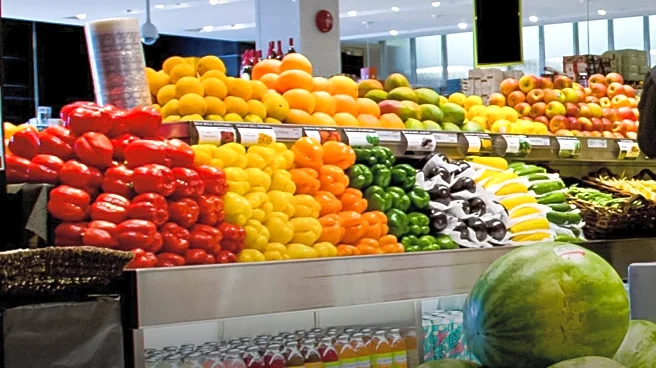What is the story about?
What's Happening?
As food costs continue to rise across the United States, meal planning experts are advocating for bulk buying as a strategy to alleviate household budget pressures. Warehouse clubs like Costco and Sam's Club offer significant savings on grocery bills, potentially reducing annual expenses by approximately $1,000 for shoppers who commit to buying in bulk. Experts emphasize the importance of considering storage space, shelf life, and actual usage of bulk purchases to avoid waste. Key items recommended for bulk buying include canned or dried beans, frozen proteins, butter, dry pasta, specialty items like spices, and paper products. These items offer long shelf lives and substantial savings, making them ideal for bulk purchasing.
Why It's Important?
The recommendation to buy in bulk is significant as it provides a practical solution for families facing financial strain due to increasing food prices. By purchasing items in larger quantities, consumers can reduce the cost per unit, leading to substantial savings over time. This approach not only helps in managing household budgets but also encourages efficient use of resources, minimizing food waste. The strategy is particularly beneficial for families with adequate storage space and those who can plan meals around bulk purchases. As food prices continue to rise, bulk buying could become an essential practice for many households, impacting consumer behavior and retail strategies.
What's Next?
Consumers are likely to increasingly adopt bulk buying practices, leading to potential changes in retail strategies and warehouse club offerings. Retailers may expand their bulk product lines and offer more promotions to attract budget-conscious shoppers. Additionally, consumers may seek more guidance on meal planning and storage solutions to maximize the benefits of bulk buying. As this trend grows, it could influence the food industry, prompting manufacturers to adjust packaging sizes and distribution methods to cater to bulk purchasing demands.
Beyond the Headlines
Bulk buying not only impacts household budgets but also has broader implications for sustainability and resource management. By reducing packaging waste and encouraging efficient use of food, bulk buying can contribute to environmental conservation efforts. Moreover, it may foster community initiatives focused on shared resources and cooperative buying, enhancing social connections and support networks.


















